How to Choose the Right Digital Experience Platform for Your Business
Think of a Digital Experience Platform (DXP) as the central nervous system of your organization’s digital ecosystem, smoothly connecting and orchestrating every interaction your customers have with your brand. It’s a powerful, integrated suite of technologies designed to craft, manage and fine-tune immersive digital experiences across an expansive range of touchpoints.
It’s easy to see why many believe adopting a DXP is the silver bullet to all their digital challenges. However, before you jump on the DXP bandwagon, it’s important to recognize that while DXPs can be powerful, they’re not a one-size-fits-all solution.
Yes, DXPs promise to solve all your business challenges, but as we’ll explore in this article, they’re not necessarily the perfect fit for everyone. There are other alternatives worth considering…and we mean WordPress and Drupal (the leading CMSs) running on Pantheon (the fastest hosting platform on the planet!).
What Are the Benefits of Using a DXP?
Unified and Integrated Customer Experience Management
A DXP delivers a consistent customer experience across various digital fronts, ensuring that your brand's voice and messaging remain cohesive, no matter how your customers interact with your business.
Beyond consistency, DXPs allow businesses to tailor content and interactions based on individual customer preferences and behaviors, fostering a sense of personal connection. This not only improves overall satisfaction but also has the potential to inspire loyalty, a key factor in long-term business success.
Advanced Analytics and Data-Driven Insights
DXPs have advanced analytics tools that dive deep into customer behavior, preferences and engagement patterns. These insights help users optimize their marketing strategies, improve targeting and increase conversion rates. They clarify the who, what and why of customer interactions so you can make smarter decisions that drive results.
Integration with Emerging Technologies
DXPs’ integration with AI and machine learning (ML) enhances personalization, automates repetitive processes and delivers smarter, more intuitive customer interactions. Whether it's recommending products based on past purchases or predicting what your customers might want next, a DXP powered by AI is like having a crystal ball for your business.
And let's remember the Internet of Things (IoT), which connects various devices to create a more cohesive and interactive customer experience, making every interaction count, no matter where it happens.
Cost Efficiency and Operational Savings
With a promise to cut costs and complexity, DXPs streamline your digital operations by integrating everything into a single, cohesive system. This consolidation leads to significant cost savings – fewer software licenses, lower maintenance costs and a more efficient operation overall. This reassures businesses that investing in a DXP can lead to tangible financial benefits.
Scalability and Flexibility
DXPs are designed with scalability, accommodating increasing traffic, content and user interactions without missing a beat. They also offer the flexibility to adapt to evolving business needs, whether that means integrating new technologies or expanding into new platforms. This adaptability instills confidence that DXPs can grow with your business, ensuring that your digital experience stays seamless, no matter how big or complex your business becomes.
Enhanced Security and Compliance
Because data breaches and privacy concerns are front and center, DXPs offer security measures like data encryption, secure access controls, and regular security updates to protect digital assets. Additionally, they help businesses stay compliant with industry regulations such as GDPR and CCPA, ensuring that customer data is not just safe but also handled with the utmost care.
The Capabilities of DXPs for E-Commerce
Marketing Automation
Marketing automation within DXPs offers significant benefits, including increased efficiency, personalized customer experiences and improved ROI. For example, Amazon’s marketing automation tools track customer behavior and automatically send customized product recommendations, leading to higher engagement and sales. Automation tools also streamline marketing efforts, allowing businesses to scale their campaigns without adding complexity.
Product Discovery
Advanced product discovery features such as AI-powered search, personalized recommendations and sophisticated filtering options are essential for e-commerce success. For instance, eBay’s AI-driven search helps users find the most relevant products to their queries, leading to increased sales and customer satisfaction. These features ensure that customers can easily find what they’re looking for, boosting conversion rates and overall shopping experience.
Sales Tools
DXPs with advanced sales tools, such as CRM integration, sales analytics, inventory management, and multi-channel sales support, provide a comprehensive solution for e-commerce businesses. Shopify, for example, integrates with CRM systems to provide detailed customer insights, while its sales analytics tools help businesses track performance across multiple channels. This integration streamlines the sales process, improves customer targeting and ultimately increases sales efficiency.
Comparing the Top DXPs
1. Adobe Experience Cloud (AEC)
Image
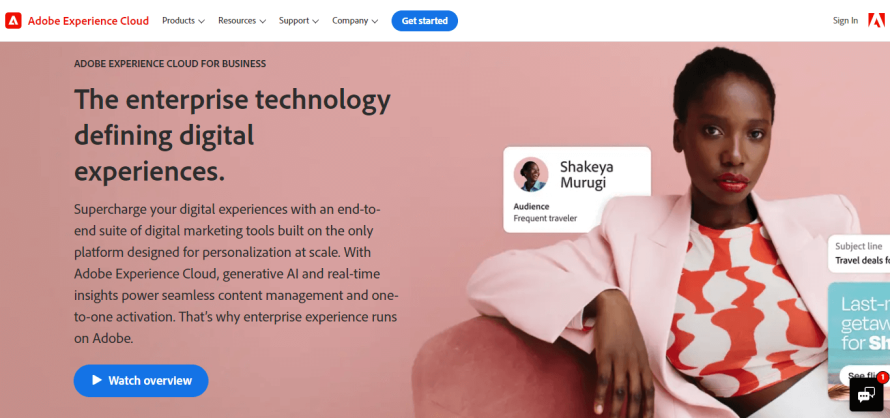
Adobe Experience Cloud is one of the most comprehensive and widely adopted DXPs in the world. It offers a full suite of products designed to deliver personalized, connected customer experiences across channels. From content management and personalization to customer data platforms (CDPs) and analytics, Adobe provides an integrated approach that helps businesses manage the entire customer journey.
Key offerings within AEC include Adobe Experience Manager (AEM), which serves as a powerful CMS for creating, managing and optimizing digital experiences across websites, mobile apps and other platforms. AEM is renowned for its flexibility and scalability, enabling organizations to deliver personalized content that drives engagement and conversion.
Another cornerstone is the Adobe Experience Platform (AEP), a powerful CDP that allows businesses to centralize and standardize customer data from various sources. AEP uses data science and machine learning to create unified customer profiles, enabling granular segmentation and real-time updates. These unified profiles can be leveraged across other Adobe products for audience activation, intelligent re-engagement and personalized experiences.
Adobe Experience Cloud is built to work easily across its ecosystem, allowing businesses to easily integrate third-party solutions via RESTful APIs. Although Adobe encourages an open ecosystem with SDKs and development tools, its core platform is commercial and licensed.
Given its vast product portfolio and leadership in the market, Adobe Experience Cloud is a dominant force in the DXP space.
2. Optimizely
Image
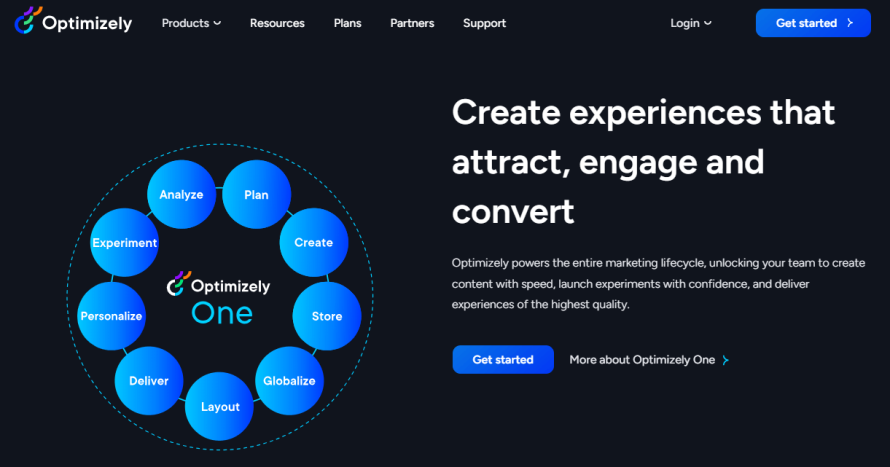
Optimizely is a powerful DXP known for its focus on experimentation and optimization. It enables businesses to test and personalize content in real-time, ensuring that the customer experience is continually refined and improved. Its key features include content management, A/B testing and customer data management.
Also, Optimizely is a proprietary platform, so you’ll have access to a well-supported, fully integrated system. However, this DXP comes with licensing fees and less customization flexibility compared to open-source solutions.
3. Acquia
Image
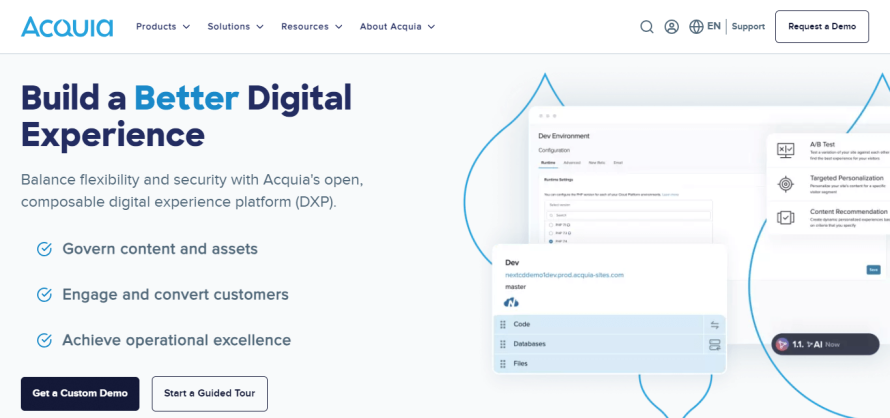
Acquia, built on the open-source Drupal CMS, offers a flexible and scalable DXP solution. It’s solid in content management, digital marketing and multi-channel delivery.
Being open source, Acquia allows for a high degree of customization, making it a popular choice for businesses needing to extensively tailor their digital experience. The open-source nature also means there’s a large community for support and a lower total cost of ownership, though it may require more technical expertise to manage effectively.
4. Sitecore
Image
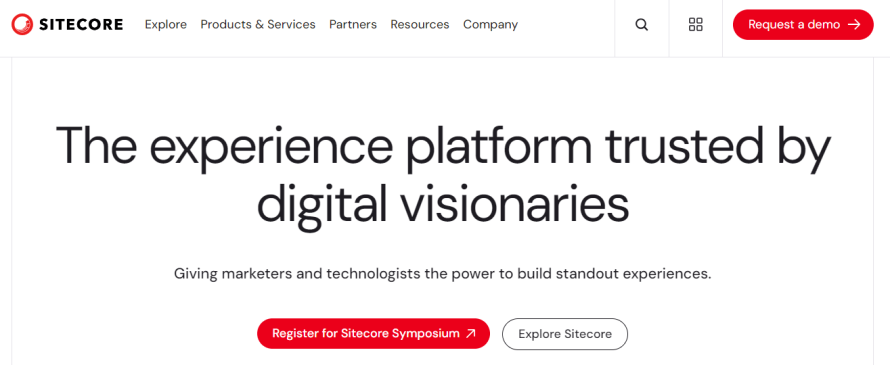
Sitecore is known for its deep personalization capabilities and integration with marketing automation tools. It offers a comprehensive suite of features, including content management, customer data management and e-commerce integration.
Sitecore’s proprietary nature means it’s a fully supported, enterprise-grade solution, ideal for large organizations with complex needs. However, this also means higher costs and potentially less flexibility in adapting the platform to specific business requirements.
5. Bloomreach
Image
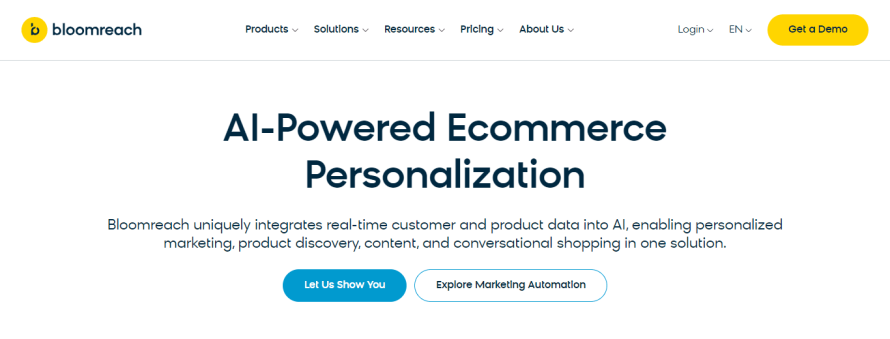
Bloomreach is an open, composable DXP that combines content management, AI-powered search and merchandising and marketing automation capabilities. It is designed specifically for brands, retailers and B2B companies to increase online sales while delivering personalized customer experiences.
Bloomreach Discovery optimizes on-site search and product discovery using AI. It provides personalized search results, product recommendations and automated category merchandising.
The full Bloomreach DXP – with its additional capabilities for commerce, marketing automation and AI-driven experiences – is a proprietary commercial platform.
Selecting the Most Suitable DXP for Your Needs Step-by-Step
Evaluate Integration Capabilities with CRM, ERP and Marketing Tools
The first step in evaluating a DXP is ensuring it’s compatible with the significant tools your business relies on, like CRM systems (e.g., Salesforce), ERP solutions (e.g., SAP) and marketing platforms (e.g., HubSpot) to prevent data silos and duplication.
A DXP that quickly connects with these systems will streamline your operations, making it easier to manage customer interactions, financial data and marketing campaigns all in one place. Incompatibility can lead to costly workarounds or even necessitate switching to different tools altogether.
Consider Data Consistency and Operational Efficiency
A DXP that offers effortless data consistency keeps your digital experience uniform and efficient as your operations expand, without performance bottlenecks or the need for frequent upgrades. This approach maintains smooth operations across different systems, aligning your teams with the same information, reducing errors and improving decision-making.
Assess AI and Personalization Features for Enhanced Customer Engagement
Personalization is necessary for effective customer engagement. Customers expect experiences tailored to their preferences and businesses that deliver on these expectations see higher satisfaction and loyalty.
AI technologies are revolutionizing personalization within DXPs. By analyzing vast amounts of data, AI identifies patterns and preferences, enabling businesses to deliver highly tailored experiences that resonate with each customer on a personal level.
The benefits of AI-driven personalization are clear: increased customer satisfaction, improved loyalty and better conversion rates. AI enables businesses to deliver the right content to the right person at the right time, making each interaction more meaningful. It also automates repetitive tasks, freeing human employees to focus on more complex activities that require creativity and strategic thinking.
Make sure you can implement the following advanced AI methodologies:
Predictive Analytics
Predictive analytics is a powerful tool that allows businesses to anticipate customer behavior and preferences. By analyzing historical data and identifying patterns, predictive analytics can forecast what customers will likely do next, from purchasing decisions to content engagement.
For example, Optimizely uses predictive analytics to decide which content is most relevant to each user’s profile, allowing for a highly tailored and personalized experience.
Natural Language Processing (NLP)
NLP enables digital platforms to understand and respond to customer queries more humanistically. NLP analyzes the language used by customers, allowing businesses to provide more accurate and relevant responses.
Many of the DXPs use NLP through AI assistants. This allows users to ask questions, automate tasks and simulate outcomes in order to get the most out of the platforms.
Generative AI
Generative AI takes personalization to the next level by creating tailored content and experiences based on customer data.
Overcoming Common Challenges Faced While Using a DXP
Ensuring Easy Data Flow and Eliminating Data duplication and Inconsistencies
While the benefits are clear, integrating a DXP with CRM, ERP and marketing tools can present challenges. Data duplication and inconsistencies are common issues, as is the complexity of integration, mainly when dealing with legacy systems.
To mitigate this problem:
- Upgrade to cloud-based SaaS solutions: Cloud-based DXPs and tools often offer more straightforward integration options, with automatic updates and built-in compatibility features.
- Conduct thorough testing before deployment: Conducting extensive testing in a controlled environment before going live can help identify and resolve potential integration issues early on.
- Use low-code integration tools: These tools simplify the integration process, allowing for faster deployment and easier management of connections between your DXP and other systems.
Facilitating Unified Operations
A DXP can help unify operations, reduce manual tasks and improve efficiency by integrating workflows and automating processes. Centralized dashboards and reporting tools offer a unified view of operations, making monitoring performance, identifying trends and making data-driven decisions easier.
Platforms like MuleSoft, Zapier and Microsoft Power Automate are excellent for connecting your DXP with other systems. These tools facilitate the smooth data transfer between platforms, ensuring your systems work together as a cohesive unit.
Are DXPs Scalable and Future-Proof?
Long story short, it depends. It all comes down to the implementation. Keep the following considerations in mind to achieve a scalable DXP:
Modular Design of Composable DXPs
Composable DXPs are designed with modularity, allowing businesses to integrate various packaged business capabilities such as CRM, analytics and content management. This modular design ensures you can easily add or replace components as your business grows or changes without overhauling the entire system. For example, a retailer might start with a basic content management module and later integrate advanced e-commerce and analytics tools as their business expands.
Multisite and Multi-Tenancy Support
Managing multiple sites or catering to different user groups becomes critical as businesses expand. DXPs with multisite and multi-tenancy support can handle this growth seamlessly. For instance, a global company like Coca-Cola manages numerous country-specific websites under a unified DXP, ensuring consistency in brand messaging while catering to local market needs.
Cloud-Based Infrastructure
Cloud-based infrastructure significantly enhances a DXP's scalability. Cloud platforms offer rapid access to new features, reduce the burden of IT maintenance and improve security. Companies like Adobe and Salesforce leverage cloud-based DXPs to deliver continuous updates and innovations, keeping the platform aligned with future business needs and technological advancements without requiring lengthy and costly updates.
Continuous Updates and Innovation
A future-proof DXP is scalable but difficult to evolve continuously. Keeping up with regular updates and the latest technological advancements ensures that the platform remains relevant and practical. Companies that rely on DXPs with a strong innovation pipeline, like Microsoft Dynamics, benefit from new features and improvements that keep their operations competitive in a rapidly changing market.
Despite these advantages, there are challenges related to scalability and future-proofing DXPs. Monolithic DXPs can be rigid, making adapting to new technologies or business needs difficult. Additionally, lengthy implementation times can delay the benefits of new features. Businesses must carefully consider these factors when selecting a DXP, opting for solutions that offer the flexibility and agility required for long-term success.
Pantheon: The Superior Alternative to a DXP
Web teams thrive when their tools and practices are flexible and evolve continuously. As Josh Koenig, Pantheon’s Chief Strategy Officer and Co-Founder, puts it:
“Web teams succeed when their tools and practices get better over time. That requires flexibility and evolution. A monolithic DXP that takes a year to deliver, specced out based on the needs you had the year before, will not serve you very well this year, let alone next year. Or the year after that.”
At Pantheon, we offer a powerful alternative to traditional DXPs by combining the best of WordPress and Drupal hosting with the agility of a WebOps platform. Our WebOps tools—such as Multidev and Dev, Test and Live environments—empower teams to collaborate in real time, allowing for rapid iteration and seamless adaptation to any changes. This agility means you can keep pace with evolving business needs without being bogged down by the rigid structures of a monolithic DXP.
Pantheon also excels in integrations, offering tools like New Relic for performance monitoring and Lytics for personalization. These integrations ensure your website performs at its best and delivers personalized experiences that resonate with your audience.
Regarding security, our platform keeps your site safe at all times with strong security measures and proactive monitoring. You can trust that your digital presence is protected against threats, giving you peace of mind as you focus on growing your business.
For more insights on why Pantheon might best fit your web team, check out our detailed comparison between DXP and WebOps platforms.
Take the Next Step in Choosing Your Ideal Digital Experience Platform
While traditional DXPs offer a range of impressive capabilities—from unified customer experiences and advanced analytics to AI-driven personalization and robust security—at Pantheon, we take these benefits to the next level. With our flexible, evolving WebOps platform, we meet the needs of today's web teams and anticipate tomorrow's challenges.
Unlike the rigid, monolithic structures of traditional DXPs, Pantheon empowers teams to iterate rapidly, integrate seamlessly with critical tools and maintain the highest levels of security – all while delivering personalized, high-performing digital experiences.
Pantheon is the superior alternative. Its unique agility, comprehensive integration options and robust security make it a far more adaptable and future-proof solution. Whether you're looking to scale your operations, personalize customer interactions or ensure data consistency across platforms, Pantheon offers everything you need.
Ready to see Pantheon in action? Watch the demo and discover how Pantheon can help you create exceptional digital experiences that drive real results!